We take for granted that we can now travel across our great country in just a few hours by plane, or a few days by automobile. You can still even cross the country by train or bus a few different ways if you desire. Yet, our modern transportation miracles have contributed to us forgetting just how one traveled from place to place back in the day. Before the interstate highway system got its start in the 1950s and prior to the aviation boom of the 1960s, buses and trains crisscrossed the countryside. You could make a trip from your moderately sized hometown to nearly any city or town between the Atlantic and the Pacific with a few interchanges. Buses like this 1931 Mack BK Parlor Coach would be one of the methods of travel. This Greyhound Lines bus would have been used during the Depression era to get you safely, and slowly, to your destination. Would you like to experience what travel was like during this period in our nation’s history?
If so, the first sacrifice would be the creature comforts we are accustomed to. Buses back then were not air-conditioned, and on-board restrooms were unheard of. Travel was by what we would call today a secondary road. Interstates wouldn’t be along for another fifty years, so 35-50 MPH speeds would have been the norm. Ventilation would come courtesy of an open window. This was also the era where taking a bath on Sunday was fashionable. Your luggage would ride on top of the bus and be subject to the elements. Of course, the only snacks and drinks available were the ones you brought. Otherwise, your best bet would be to grab something quickly at a stop in the next town. Still, in a country where automobiles were only beginning to be used for long-distance travel regularly, it was a means of getting to a faraway destination.
Roll the clock forward to today. According to this article, the bus you see here was originally a Greyhound bus and was restored and operated to celebrate the company’s heritage. The article goes on to explain in detail how Greyhound embarked on a program to purchase and restore a fleet of historic buses in the late 1970s. Starting with Scenicruiser 001 which was still in their fleet but was slated to be sold, the company president used these restored buses in appearances nationwide to drum up publicity for the brand. These appearances were reportedly quite successful and even included drivers dressed in period uniforms. The biggest threat to this fleet of historical buses proved to be the company’s financial woes. The bankruptcy filing in 1990 and the profit-driven whims of Greyhound’s numerous parent companies since then have whittled the fleet down to three buses that have been for sale since last year.
Of the three remaining survivors, the bus you see above and below is perhaps the most interesting. It is a 1931 Mack Model BK, restored to a high degree and decked out in Greyhound’s color scheme for the period. With a 525 cubic-inch inline-six-cylinder engine under the hood, this Mack was said to be capable of 70 MPH back in its day. According to the seller, 544 buses were built on BK chassis from 1931 through 1936, and they all went to Greyhound. They boasted seating for 33 passengers. Since buses competed almost directly with passenger trains at that time, these Macks were styled in the rear to look like an observation car on a train.
The seller speculates that the order with Mack was cut short due to the financial hardship people faced during the Great Depression. Many forget that the Depression lasted through the 1930s and some historians believe that the entry into World War II and the massive influx of government spending pulled the country out of it. Regardless of the opinions of historians, the reality was that Americans were suffering and had been so for a long time. You can imagine the excitement a person would feel before stepping on a bus like this to travel during such a time no matter what the reason. Our modern concept of vacationing would be foreign to most Americans at the time.
Stepping onto the bus, travelers would be greeted by a very modern interior with space for smaller luggage on the shelf above them. Accommodations seem to be comfortable and spacious compared to the “cattle car” principles that govern modern air travel. The seller’s claim that Greyhound fully restored this “museum quality” bus is evident in the upholstery work we can see and the level of detail exhibited down to the curtains in the windows. It is a shame that such an interesting look into the past could not continue touring the country to demonstrate bus travel so long ago. Hopefully, this neat old Mack will find a safe home soon and be displayed frequently.
If you would like to give this historic 1931 Mack BK Parlor Coach, formerly used by Greyhound Lines, a new home, then you can find it for sale on Facebook Marketplace in Los Angeles, California. While the seller estimates the vehicle is worth more than $200,000, it is currently being offered for a more reasonable $98,500. Thanks to Flint F. for this amazing find!
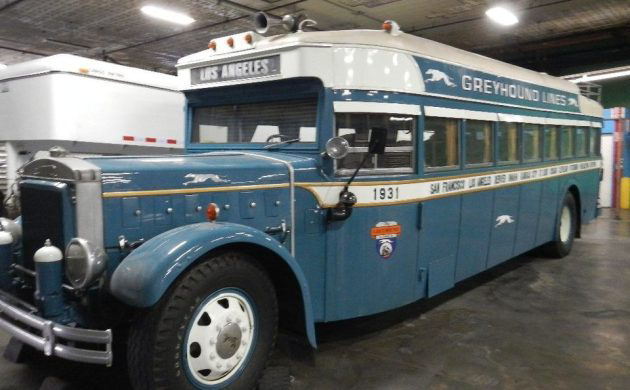
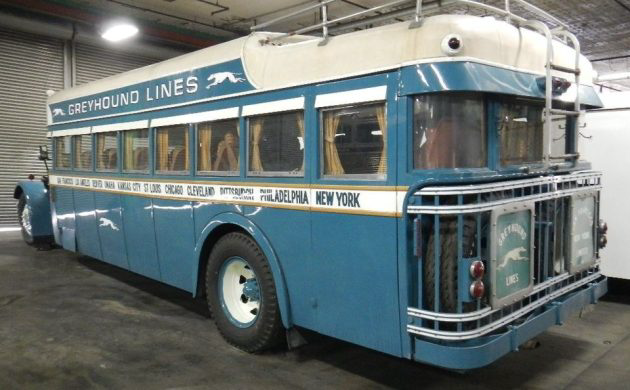
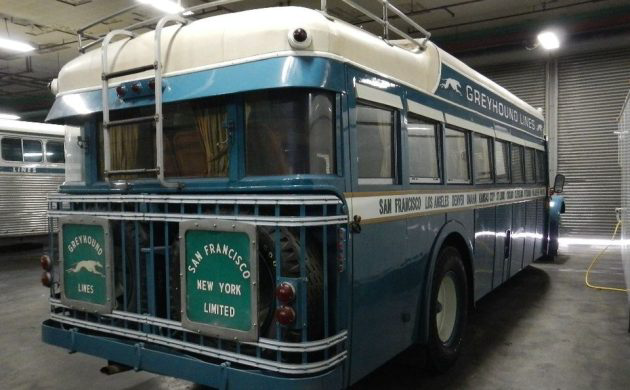
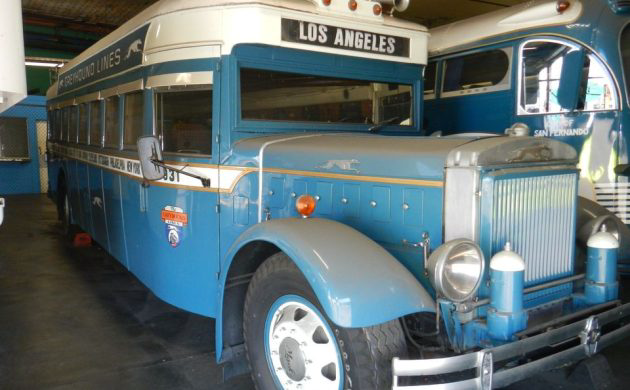
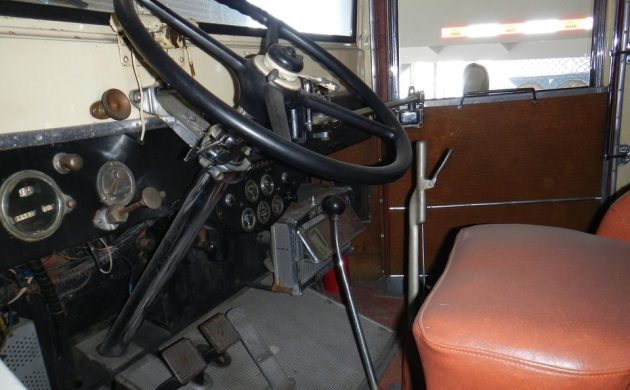
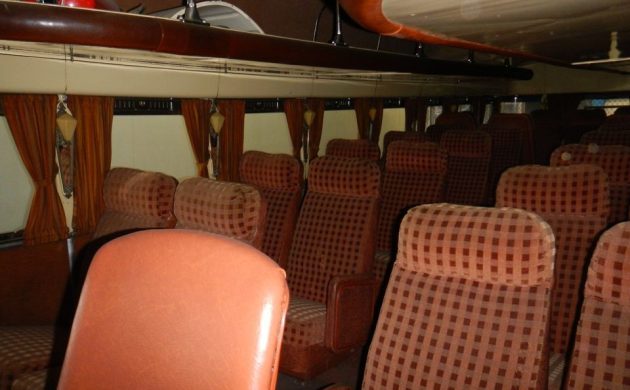
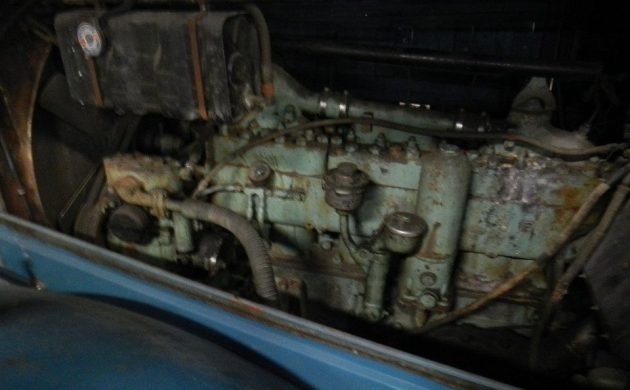



I am waiting for Howard to comment.
Aw, thanks, pal, us “Howies” need to stick together, a little gun shy after the Subaru Justy post. I can get away with being a crabby old man because I am one.
What are the 2 vertical cylinders on the front? Some sort of air tanks?
Hi CK, took a while, but those are actually called “Westinghouse Air Springs”, and was a meager attempt to reduce bouncing. While Westinghouse was known for his brake and electrical innovations, the “air spring” was a start at smoother rides.
What a unit. No mention of transmission. Any ideas .. ?
I always liked the shock absorbers that we placed out front just behind the bumper.
I believe these motors were rated for about 60 H.P. (according to another Barnfinds article on a fire truck version of one of these) They just had a lot of torque and spinning mass, which is how this one apparently cracked 70 mph.
The seller also has an original Scenicruiser for sale (minus the strange double Detroit 4-71 fluid coupling engine set up in the rear) at $160,000.
Here is the other Mack article: https://barnfinds.com/not-run-1930-mack-fire-truck
Good Night To All
Flint
This is an interesting gal, and many may not even know Mack made transit buses. Fact is, I read, the 1st 6 cylinder Mack was a bus in 1927. I believe the BK had a 6 cylinder gas motor of Macks design, 534ci with about 128 HP. and a 4 speed” crash box” transmission. The “BK”shown here, boasted front brakes and better accommodations, and was replaced in 1934 with a more modern one. I read, this bus may have been in a 1994 TV movie called “One Christmas”. It starred Henry Winkler and takes place in the early 30s and a bus just like this was used. There are still plenty of attractions where a bus can be used, especially out here. Thing is, you’d be hard pressed to find 33 people going somewhere, except maybe the elderly to bingo on Thursday 2 towns over. 28 returned. $200k for this is serious money, to me, but I think a business could absorb it. Then,,who is going to drive it? And at 35 mph, where? Something like this shouldn’t be allowed on the roads today, and maybe as a display outside “Silver Dog” headquarters in Dallas, Tx. but slim pickens on who might want it.
Tip of the hat to Jeff, whose posts never disappoint, and a small reflection of moving people in the 30s in the US. Officially, the “Great” depression ended in 1941, when war began. Everybody went back to work, but I heard, govt. projects basically put food on the table, and a bus was the only way to get around. A little over half Americans had a car in the 30s, bus travel was huge. After Greyhound sold these off, I’m sure a cheaper bus company bought them, and ran them well into the war. I bet a lot of GIs from Bugtussle, NC. rode a bus like this, possibly for the last time. There was nothing elegant about bus travel then, trains were not rural friendly, airplanes were unheard of, the bus was it for millions. Today, bus travel is relegated to the poor, downtrodden or those still afraid to fly, With car travel a pita, and don’t get me started on airports( the actual flying is great), bus travel is making a comeback. I read, it takes 30hours and 15 minutes to go, by bus, from Denver to Portland, OR. That same trip by train was a whopping 68 hours, cost about the same. I think I could do 30 hours on a “sit & stare” bus ride. I can only imagine it took a week in this bus. We’ve come a long ways in travel.
Thanks Jeff for the excellent write-up. Especially the discussion of what long-distance travel was like nearly 100 years ago. Today we take the ability to readily travel hundreds, even thousands of miles for granted.
If you check out the c.1934 movie,’It Happened one Night’,part of it involves travel on a bus similar to this one back when this stuff was current.
I was thinking the same thing about that movie and this bus. It was Claudette Colbert, who I think was top billing over Clark Gable, and was it Shapely who was trying to pick up Claudette? Clark scared him off soon though. Award winner. Good bus engine sounds.
Russ’s Bus, The Adventures of an American Bus Driver by Russel A Byrd published in 1945 with a latter update including the “Casa Loma Flyer” with band on board: Over the years have read it more than once.
Obviously no space here for a multi-page review, but there’s a simple way to sample his words and pics before parting with a few bucks for a copy. Go to Ebay dot com and search for Russ’s Bus in books. A half dozen or more will pop up and many of the sellers include photos of text and picture pages.
Those New Mexico and Colorado scenes hint at how treacherous the conditions good be and who can resist a tale of picking up “bums” to keep them from freezing. Multiple states and exploits including what passengers expected and prepared for provide a first person account of travels and travails of those years long gone.
Just found, and bought, a copy on Ebay, signed by the author. Looks like a fun read. Thanks for the review!!
I believe these were rated for about 60 horsepower, but they had massive amounts of torque and spinning mass, which is how this broke 70 mph. , (According to a past Barnfinds article about a fire truck version of these.)This seller also has an original Scenicruiser for sale (minus the two 4V-71 Detroits and the fluid coupling set up) at $160,000
Here is the other Mack article: https://barnfinds.com/not-run-1930-mack-fire-truck
Good Day To All
Flint
Add says its still owned by Greyhound and its valued at $200,000 but its listed for $98,500 not sure how they got to the $200k valuation if its worth that sell it for that. Otherwise its only worth what the buyer is willing to pay. It might be kinda fun to convert it into a motor home and cruise around. Other than that I don’t see any value in it.
Only possible value is if some producer needs one for a movie but its a stretch. A convert to a motor home may be the best option, if cash on hand for that type of build project, wasn’t an obstacle.
maybe Greyhound confused Henry Winkler with Steve McQueen? may have thought Steve drove it in Bullitt? never heard of; one Christmas. was the Fonz still jumping sharks in 94?
In 1931 Denver to Portland was ~40-45 hours by train. Likely was more like 50-60 hours or more by Greyhound bus. Roads were poor. Source: Google’s AI platform.
One of the most interesting vehicles I have ever seen on B.F. I certainly hope the old girl finds a good home, and hope the similar restored versions do so as well. By the way, there are still roads in North America where this old bus could safely travel. These roads are rural, nowhere near an Interstate or a large city, and very much resemble the asphalt byways of the 1930s. I certainly would be happy to purchase a ticket and climb on board along with 32 other geezers for a short tour into a better and more pleasant past. It would be like a ride on a time machine.
Shortly before my mother’s death in 1996, she took a bus from Childress Tx to Wichita Ks. Something happened en route that caused her to be “lost” for about 12 hours according to the bus company. She said she wasn’t lost, she knew where she was.
I took a bus from OKC to Amarillo in about 2010 and there is a broad slice of demographics on a bus trip. Very interesting what you hear.
Really cool, somebody should start a route 66 tour company…
That was the first thought that came to my mind too. What a blast to tour Route 66 in this bus! You’re going to have plenty of time though as I’m sure many people among the way will want to see and talk about this grand old bus. What an adventure!
I drove for Greyhound from 1963 until March 1st of 1990 at which time our union went on strike that lasted three years. That strike destroyed the company. All because of corporate greed. Greyhound never recovered from that strike and has never been the same. This bus or one just like this one was in N. Y. and our district manager asked me to be fitted for the uniform of that era. These busses were a horror to drive, there was no power steering and some of the clutches were so stiff that at the end of the day your left leg was very sore. Thanks for the memories.
Enzio
Back when Trucking was a very serious proposition. Trucker courtesy was most likely as much out of self preservation and ability as it was general good manners. I’m impressed by just how modern a ’31 Mack looks from front styling.
Great comment…. When I was a kid in the 70’s my Grandmother used to comment all the time about how wonderful and courteous the truck drivers “used to be”.
My Gramma and her best friend in their 80s riding the bus from small town Saskatchewan to Southern Ontario. Switched buses in windy, wintery Winnipeg. Had their transfers in gloved hands. Went to board and had nothing between their pinches fingers to give the driver. He laughed. “Go ahead ladies. Climb aboard”. Different times.
I started trucking in the late 70s, and caught the end of the trucker courtesy thing. For me, it wasn’t so much helping other motorists by then, but more of a camaraderie amongst my fellow drivers. Trucking is, and always has been, a night time job. Before any kind of communication, the truck driver was the only one out at 3am and many times, the only hope for a crash victim after closing time. Police were stretched pretty thin back then, and I don’t ever recall helping too many motorists. For truck drivers however, it was practically required to help another driver. I did many times, and others helped me. The cell phone took care of all that, and vehicles today are piloted by faceless nobodies, and help is a push of a button away. A different world indeed, and quite frankly, one I don’t really care for.
Interesting old bus . . My dad drove for Trailways from the early 1940’s until 1956 . . He mentioned driving ACF’s , Fitzjohn’s , Buick Flxible’s and a few more I can’t remember . . His career was cut short in 1956 . . He drove a charter trip to Daytona Beach with a high school senior class . . While there he had a heart attack . . He survived and lived ‘till 1995 but his driving career was over . . Blood thinner and oxygen was about all they had back then , I guess . .
“I think I could do 30 hours on a “sit & stare” bus ride.”
And you would probably have the bus all to yourself after three hours if you started telling stories about the “Good Ole Days”
Keep tossing me these softballs, buddy!
Ahh the good old days took me 22 hours on a bus from Orlando to Tampa MEPS station 40 years ago stopped at every town on the way! I swear I could walk faster & my last bus ride no offense meant . I’m sure it was a lovely way to travel at one time, just not this time.